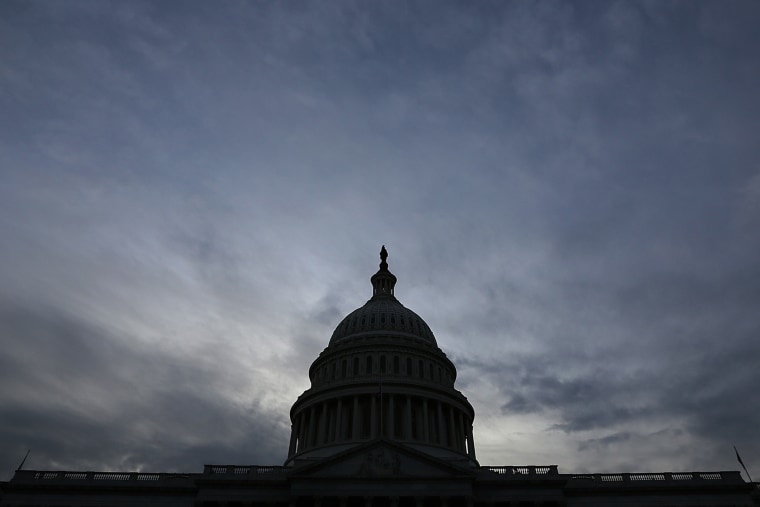Congress is officially on summer break. Lawmakers have five weeks to stump in their home districts, raise money, and maybe even take a vacation. But a very stark reality awaits them upon their return to Washington in September.
Already, the 113th Congress is on pace to become one of the least productive in recent history. And even a five-week holiday isn't likely to get this politically-divided body any closer to passing meaningful legislation.
The majority of Americans aren’t optimistic either. According to a new national NBC News/Wall Street Journal/Marist poll, 74% of voters believe the Congress has been unproductive, with just 19% calling its actions productive.
Meanwhile, President Obama said over the weekend that because of Congress’ inaction, he’s weighing executive action, particularly on immigration -- which will surely draw the ire of conservatives who are already trying to sue the president over what they see as his abuse of power. The commander-in-chief lambasted Congress for leaving town without settling “unfinished business.”
Here’s what will be on Congress’ plate when lawmakers return to Washington on Sept. 8.
Immigration: Congress was unable to hammer out an emergency funding deal in responding to the surge of immigrants coming across the country’s southern border.
Obama had requested $3.7 billion in emergency funding to beef up border security and speed up the processing of tens of thousands of arrivals, many of them children. Senate Democrats put forth a $2.7 billion package that was blocked by Senate Republicans last week. The GOP-controlled House passed a much smaller $694 billion package, which was skewered by Democrats who voted against it, saying it was not enough. President Obama and the Democratic-controlled Senate have made it clear that the House legislation will go nowhere. Obama is reportedly looking into what executive actions he may take.
Funding the government: While the House has greenlit approximately half of the spending bills establishing budgets for government agencies for the fiscal year beginning on Oct. 1, the Senate has yet to vote on such measures. Both houses need to pass a spending bill by the end of September. House Speaker John Boehner has said he’s prepping a stop-gap spending measure so that the government doesn’t run out of money after September. If that doesn’t work, expect more talk of yet another government shutdown.
Mass transit and Veterans Affairs: Congress did manage to pass last-minute bills on these issues, but critics say they aren’t sufficient.
On Thursday, the two houses approved a $10.9 billion funding extension for transportation projects through May, avoiding a cutback in federal payments to states that was slated to start on Friday. Critics, however, say Congress is doing nothing to address the longer term funding problems and is just kicking the can down the road. After all, big infrastructure projects require sustained funding and long-term planning.
Congress was also able to pass a bill allowing veterans to get private care and adding $17 billion to the Department of Veterans Affairs to hire doctors to address long waiting times. Critics say the bill does little to address the big picture problems the scandal-plagued VA faces. Plus, there are a slew of other VA bills that have yet to reach the floor, which touch on issues like disability-claims backlog, suicide, and the lack of electronic health records.
Terrorism insurance: On Dec. 31, a law that provides government-backed insurance against terrorist attacks (signed into law in 2002) expires unless Congress acts. In July, the Senate voted to reauthorize the measure for an additional seven years, but the House has yet to vote. Some House Republicans have argued the program was never intended to be permanent.
Renewing the Export-Import Bank: The financing power of the 80-year-old federal agency that helps American companies attract customers overseas by absorbing risks private lenders likely wouldn’t take on, expires on September 30. Obama has warned that companies like Boeing and General Electric may consequently lose foreign sales if Congress fails to reauthorize the bank. Meanwhile, tea partiers and many on the far right want to shut down the bank, arguing the government is getting too involved in the private sector and that its existence amounts to “crony capitalism.”
And there's more ... : Efforts to pass lofty measures including reforming the tax code, raising the minimum wage and extending long-term unemployment either failed or went nowhere. Whether or not lawmakers take another go at these measures is yet to be seen.
